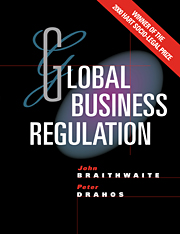17 - Sea Transport
Published online by Cambridge University Press: 04 August 2020
Summary
History of Globalization
Rhodes to Rome to Hamburg
Although ships are less important than motor vehicles or planes for moving people, they move 95 per cent of international trade (Mankabady 1984: 177). The regulation of shipping acquired a global character earlier than most of the regimes discussed in this book. The industry always had an international character and risks were and still are high. Almost every year more than two hundred large ships (over 500 tons) sink (Lloyd's Register of Shipping a; Lloyd's Register of Shipping b). Since Roman times, when Pompey the Great was authorized in 68 BC to lead an expedition against the pirates of the eastern Mediterranean, countless ships have been lost to piracy (Rubin 1988: 7). These days piracy is much less of a problem.
The Sea Law of Rhodes, which is thought to have dated from about 300 BC, was important in the customary law of commerce of the Roman empire (Berman 1983: 340). For example, the 'law of general average’ in Rhodian Law provided that ‘it is lawful to throw over as much of the loading as might put the ship in a position to resist the storm. And because it seldom happens that the whole loading belongs to one merchant, it is justly provided that the person whose goods are cast overboard shall not be the only loser, but that the others shall contribute towards the loss of those that were thrown overboard proportionately and not according to bulk but to value' (Astle 1981: 1). The Digest of Justinian (Justinian 1985: 419-22) explicitly incorporates the Rhodian Law of general average into Roman law. After the rediscovery of Justinian's Digest at the end of the eleventh century, considerable refinement of Roman maritime law occurred through codifying the trading practices of the Italian city-states. These Mediterranean foundations have given the law of bills of lading, for example, ‘remarkable likenesses in all countries’ (Astle 1981: 1).
Even though by the nineteenth century a millennium of globalization had created a situation where all nations subscribed to the law of general average, the law was applied in different legal systems in different ways. Therefore, a Glasgow conference in 1860 adopted a number of resolutions on general average, and a conference at York in 1864 saw the formulation of eleven York rules (Mankabady 1987: 283).
- Type
- Chapter
- Information
- Global Business Regulation , pp. 418 - 437Publisher: Cambridge University PressPrint publication year: 2000



